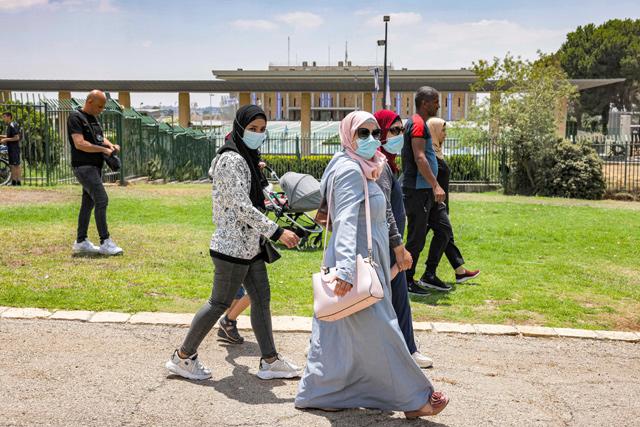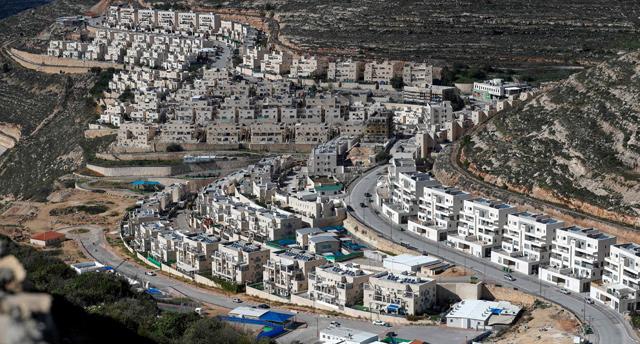You are here
Israel PM suffers defeat over Arab family unification ban
By AFP - Jul 07,2021 - Last updated at Jul 07,2021

Arab Israelis walk during a demonstration ahead of the vote on the controversial Citizenship and Entry law, outside the Knesset building in Jerusalem, on Monday (AFP photo)
OCCUPIED JERUSALEM — Israel’s Prime Minister Naftali Bennett accused his opponents on Tuesday of harming national security as his coalition failed to extend a ban on citizenship for Palestinian spouses from the West Bank and Gaza.
The ban first enacted in 2003 during the second Palestinian intifada, or uprising, has been justified by supporters on security grounds — but critics derided it as discriminatory towards Israel’s Arab minority.
The ban has caused endless complications for Palestinians living across Israel and the territories it has occupied since 1967. Many of those affected live in occupied East Jerusalem, often with Israeli residency but not citizenship.
The failure to pass the ban’s extension in a parliament vote early Tuesday highlighted tensions within Bennett’s ideologically diverse eight-party coalition that spans his far-right Yamina Party to Raam, a conservative Islamist Arab faction.
It was also a success for Benjamin Netanyahu, who is now the opposition leader after Bennett ousted him following 12 straight years as premier.
“The opposition deliberately took a direct strike at the state’s security, out of some sort of bitterness and frustration,” Bennett fumed. “They ultimately harmed the good of the country.”
‘Faultline’
In overnight talks, Bennett’s coalition had sought a deal for nearly all of its members to back the ban’s extension, including Jewish left-wingers and two Raam lawmakers.
In exchange, the government would have granted residency or citizenship rights to more than 1,500 Palestinians who have been living in Israel for many years. They represent a fraction of the total cases.
But that compromise failed when a member of Bennett’s hawkish Yamina Party, Amichai Chikli, voted with the opposition, tweeting later that the debate over the bill was “proof” that a government without a “clear Zionist majority” would be “problematic”.
His defection left parliament tied at 59 to 59 votes, meaning the measure would lapse later Tuesday.
Bennett had called for opposition right-wingers to support the measure, urging unity on national security grounds.
According to Israel’s N12 website, Netanyahu, the veteran politician dubbed Bibi, told members of his Likud Party “the importance of toppling the government is greater” than renewing the ban.
“This isn’t just a law. It’s a law that exposes the faultline in this government,” added Netanyahu, who has made no secret of his desire to unseat Bennett and reclaim the premiership.
Raam leader Mansour Abbas, the first Arab party chief to ever join an Israeli coalition, voted for the measure along with one of his three fellow party members.
He told army radio that the coalition needed to “take stock” after the setback.
Members of the Joint List, a bloc of parties representing Palestinian citizens of Israel that did not join Bennett’s government, rejoiced at striking the law down.
Its lawmaker Ahmad Tibi, in an impassioned speech on the Knesset floor, called the ban an “order for breaking up Palestinian families”.
Bennett charged that “everyone who voted against the citizenship law, from Bibi to Tibi and up to Chikli, chose playing politics over the good of the citizens of Israel”.
Interior Minister Ayelet Shaked, also of Yamina, tweeted that the ban’s expiry could bring 15,000 Palestinian applications for Israeli citizenship.
‘Partial victory’
In a protest against the measure outside parliament on Monday, some recounted the hardships of seeking permits to join their spouses, or the risks of entering Israeli territory without permission.
Ali Meteb told AFP that his wife not having Israeli residency rights had confined his family to a “continuous prison”.
Lawmaker Ram Ben Barak of Yesh Atid, a former deputy director of Israel’s Mossad intelligence service who voted to extend the ban, told army radio that, while the ban served security goals, it should be reexamined.
“It’s absolutely clear that not everyone who asks to be united with his family or to marry someone in Israel is automatically a terrorist,” said Barak.
Jaafar Farah, the head of the Mossawa Centre that campaigns for the rights of Arab Israelis, said the failure to renew the law marked “a partial victory” in an 18-year battle that is “not over,” condemning the family unification ban as “racist collective punishment”.
Related Articles
OCCUPIED JERUSALEM — Israeli lawmakers dissolved parliament on Thursday, forcing the country's fifth election in less than four years, with
OCCUPIED JERUSALEM — Israel advanced plans for building more than 3,000 settler units in the occupied West Bank on Wednesday, a military spo
A pending US framework proposal to propel stumbling Israeli-Palestinian peace talks forward chipped away on Wednesday at a troubled alliance between Prime Minister Benjamin Netanyahu and an ultranationalist ally in his governing coalition.

















